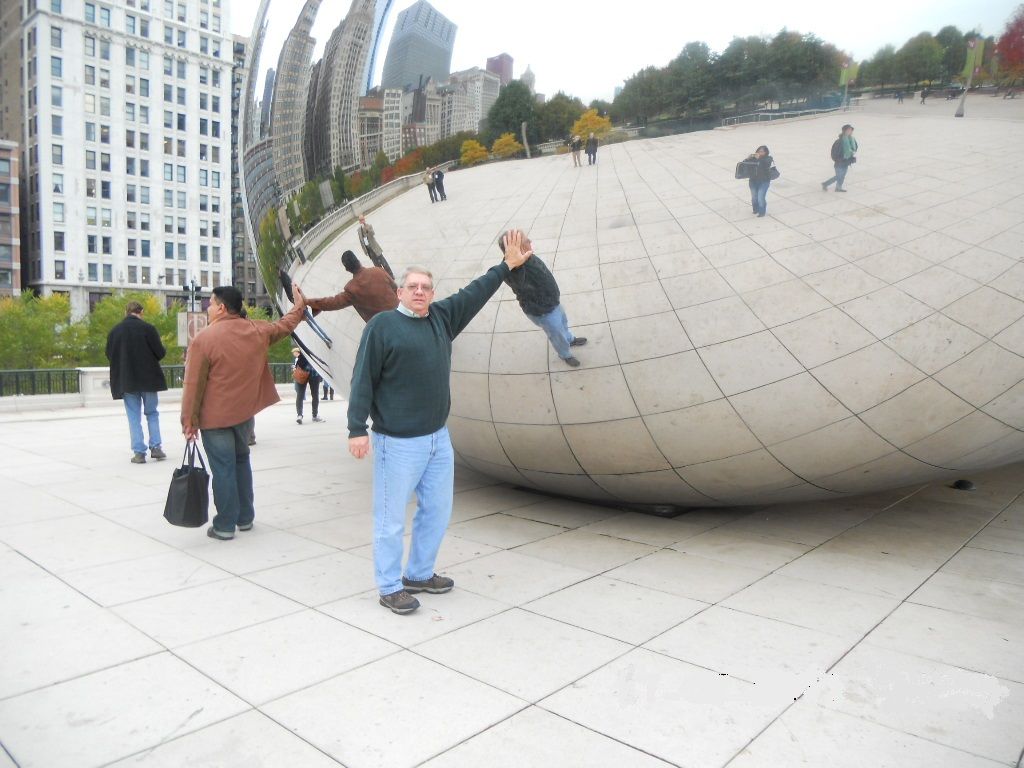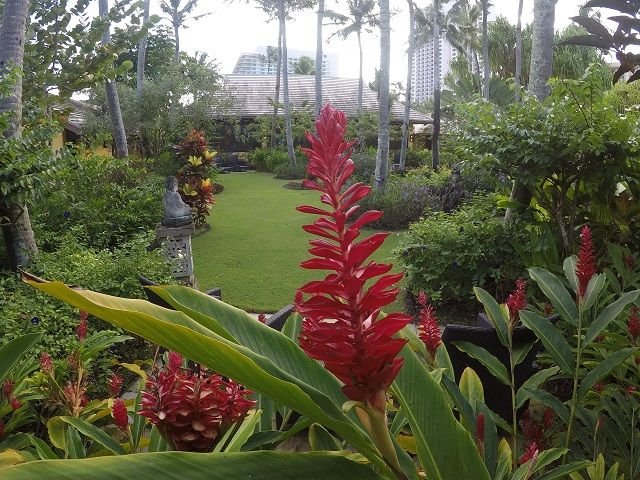Have You Reflected on Anything Lately? Western societies are evolving... and not for the better!
Reflections and the Realizations of Cultural Change.

Have you ever just sat back and reflected on things? Your car, your house, your job? Your past? Or how about something greater?... your relationships, your family, your country... maybe even your life? Sure you have - everybody does it from time to time. It is a natural thing to do. Reflection is a process of examining and interpreting experience to gain new understanding.
What I disclose here below is strictly from my perspective, created by observations and experiences, and backed up by real-life events that we are all privey to these days. We should all do good to reflect upon our life and family... it is a like a secret contentment - it is a gift, not a right.
When I first came to Guam as a nineteen-year-old kid just barely out of high school, one of the first things I realized is that while the Guam (Chamorro) culture, which is basically Asian islander, was nothing like what I grew up with in Illinois, although there was some similarity with family values and family closeness. I was raised as a 'loose' Catholic (meaning we were regulary sent to church but with little conviction) in a small town and our family was close-knit. Even though many of our extended family lived up to 90 miles distant, we still had a closeness and ties and we would always get together for family outings and holidays.
In as early as the mid 60's, the family began to fragment with the first aunt and uncle and 3 cousins to move off to the promised land, California. It wasn't quite another 15 years or so before the big split where some migrated south to Texas (my immediate family) and others moved out to the Northwest. One uncle landed his family in North Florida then moved to Arizona and another uncle dropped anchor in South Florida.
Over time, not only did the geographic ties disintegrate, so did the emotional ties. After the big split in the 70's, our immediate family stayed intact with mother and father establishing the new Texas homestead which for the next 30 years was called home. Now only two of us six siblings remain in Texas (with mom and dad and one brother deceased) with two sisters in Southern California. I guess I am the gypsy blodded one in the family who moved more than just across the continent, I moved halfway around the world. That is because I could never shake the culture of Asia. I have referred to it as an affliction of sorts... one that there is no cure for. Okay, I also married a Filipina and that had a lot to do with it.

I spent a good part of my early and middle 20's working and living on Guam, then returned to the mainland for a couple of years before I eventually found myself back working in the Western Pacific. It was the Philippines this time and is where I met my match, my wonderful wife. We left the Philippines together and returned to the U.S. and worked for 27 more years before retiring. A bit more mature and experienced, I now realized the larger differences between the two cultures. While the Asian culture remained relatively unchanged all these years, the American culture has seemingly almost totally disintegrated. Imploded is probably more accurate.
Today we all witness the constant social media posts and memes that talk about how things used to be, with strong overtones of dissatisfaction, and sometimes even disgust. My generation (Boomers) is going through withdraws of another kind... just longing for them "Good old Days!" I see it with my U.S. family where the splintering of the clan has resulted in "pockets" of relatives scattered across the continent that no longer have any of the familial ties we once had. It also seems that any real concern for each other is basically restricted to social media. I can say that I am closer to my wife's family than that of my own, even with the language barrier, and I know in my heart that they genuinely care about me, and that is what really matters.
Living in the Philippines at this later stage in my life has taught me a lot this last several years, and even now that I am spending my time in Guam, I can attest that life is different here in this part of the world - and it is better! I could take the time to try to further explain but I have this letter that I came across some time ago that I would like to share with everyone. It is a sentimental 'open letter' from an American expat teacher to the people of the Philippines - The Filipino People. And I think it sums up a lot of the feelings by many in my generation.
LOVE LETTER TO FILIPINOS
By David H. Harwell, PhD
"I am writing to thank Filipinos for the way you have treated me here, and to pass on a lesson I learned from observing the differences between your culture and mine over the years.
I am an expatriate worker. I refer to myself as an OAW, an overseas American worker, as a bad joke. The work I do involves a lot of traveling and changing locations, and I do it alone, without family. I have been in 21 countries now, not including my own. It was fun at first. Now, many years later, I am getting tired. The Philippines remains my favorite country of all, though, and I’d like to tell you why before I have to go away again.
I have lived for short periods here, traveled here, and have family and friends here. My own family of origin in the United States is like that of many Americans—not much of a family. Americans do not stay very close to their families, geographically or emotionally, and that is a major mistake. I have long been looking for a home and a family, and the Philippines is the only place I have lived where people honestly seem to understand how important their families are.
I am American and hard-headed. I am a teacher, but it takes me a long time to learn some things. But I’ve been trying, and your culture has been patient in trying to teach me.
In the countries where I’ve lived and worked, all over the Middle East and Asia, it is Filipinos who do all the work and make everything happen. When I am working in a new company abroad, I seek out the Filipino staff when I need help getting something done, and done right. Your international reputation as employees is that you work hard, don’t complain, and are very capable. If all the Filipinos were to go home from the Middle East, the world would stop. Oil is the lifeblood of the world, but without Filipinos, the oil will not come from the ground, it will not be loaded onto the ships, and the ships will not sail. The offices that make the deals and collect the payments will not even open in the morning. The schools will not have teachers, and, of course, the hospitals will have no staff.
What I have seen, that many of you have not seen, is how your family members, the ones who are overseas Filipino workers, do not tell you much about how hard their lives actually are. OFWs are very often mistreated in other countries, at work and in their personal lives. You probably have not heard much about how they do all the work but are severely underpaid, because they know that the money they are earning must be sent home to you, who depend on them. The OFWs are very strong people, perhaps the strongest I have ever seen. They have their pictures taken in front of nice shops and locations to post on Facebook so that you won’t worry about them. But every Pinoy I have ever met abroad misses his/her family very, very much.
I often pity those of you who go to America. You see pictures of their houses and cars, but not what it took to get those things. We have nice things, too many things, in America, but we take on an incredible debt to get them, and the debt is lifelong. America’s economy is based on debt. Very rarely is a house, car, nice piece of clothing, electronic appliance, and often even food, paid for. We get them with credit, and this debt will take all of our lifetime to pay. That burden is true for anyone in America—the OFWs, those who are married to Americans, and the Americans themselves.
Most of us allow the American Dream to become the American Trap. Some of you who go there make it back home, but you give up most of your lives before you do. Some of you who go there learn the very bad American habits of wanting too many things in your hands, and the result is that you live only to work, instead of working only to live. The things we own actually own us. That is the great mistake we Americans make in our lives. We live only to work, and we work only to buy more things that we don’t need. We lose our lives in the process.
I have sometimes tried to explain it like this: In America, our hands are full, but our hearts are empty.
You have many problems here, I understand that. Americans worry about having new cars, Filipinos worry about having enough food to eat. That’s an enormous difference. But do not envy us, because we should learn something from you. What I see is that even when your hands are empty, your hearts remain full.
I have many privileges in the countries where I work, because I am an expat. I do not deserve these things, but I have them. However, in every country I visit, I see that you are there also, taking care of your families, friends, bosses, and coworkers first, and yourselves last. And you have always taken care of me, in this country and in every other place where I have been.
These are places where I have been very alone, very tired, very hungry, and very worried, but there have always been Filipinos in my offices, in the shops, in the restaurants, in the hospitals, everywhere, who smile at and take good care of me. I always try to let you know that I have lived and traveled in the Philippines and how much I like your country. I know that behind those smiles of yours, here and abroad, are many worries and problems.
Please know that at least one of us expats has seen what you do for others and understands that you have a story behind your smiles. Know that at least one of us admires you, respects you, and thanks you for your sacrifices. Salamat po. Ingat lagi. Mahal ko kayong lahat."
David H. Harwell, PhD, is a former professor and assistant dean in the United States who now travels and works abroad designing language training programs. He is a published author and a son of a retired news editor.
To those who have traveled abroad extensively, we can all attest to much of what Dr. Harwell claims to be true in this letter. But on the contrary, I can also point to some Filipinos in the west who have transformed themselves into complete "Westerners," but that is a rare exception. Some have made that full transformation to 'materialism' but they have retained the strong family ties, even when located some 8,000 miles apart for many years. I've seen it with Filipinos that are not related to each other, but still build strong ties and relationships with each other while outside their country. It is a testament to an upbringing that should never be challenged as it has in the west. Are the East Asian or Filipino Cultures perfect? No, not by the farthest stretch of any imagination, but they do posses many elements and important qualities that are paramount to the very enjoyment of life.
While a radicalized liberalism of western society has and continues to destroy the very fabric that once tied "multi-cultural" societies together at a rapid pace, one can only surmise how much longer the more singular-cultural societies can last. Or will things go a different way? Either way, I know I won't be around to see it... and that will be a good thing. I will just enjoy it all while I can.

Image credits: Retired in Samar



I just read a comment resulting from a gun issue discussion and led this American teacher to comment about American culture - I'd like to share. A teacher wrote: "Six of my students talked all the way through the moment of silence for the dead students. And ya'll think an inanimate object is the problem. Culture is the problem. Our music celebrates drugs, gangs, rape and murder. Our movies make millions off of scenes of crime, murder and gunfights. We teach the children they can do no wrong then bash the law and order and and teach them to hate authority. Society created this."
I believe this teacher is on to something!
It's true there's hardly any change in Asian culture but that of American culture has simply exploded. The modernisation for sur has made such an explosion.
You're right. While the rest of the world runs amuck, Asian cultures seem to be very stable. One thing that is really noticible is how the elderly are treated with respect. You don't see many nursing homes in SE Asia. It's family over business!
Thats what is good for humanity. If we start seeing more and more nursing homes means more people will have an option of keeping the elderly people in these homes and it by no means is good. Anyways let me tell you there is no nursing home in my place. Kashmir. We do respect our parents.
My point exactly... that is a good thing!
Yes it is true more the nursing homes more will be the option available to keep your parent away.. This will degrade the love that once we had for family..